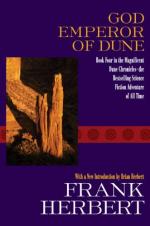|
This section contains 1,161 words (approx. 3 pages at 400 words per page) |

|
Point of View
Frank Herbert narrates God Emperor of Dune in the third person past tense, often quoting newly found historical sources to clarify what has happened in the 3,000 years that have passed since Children of Dune. As in the earlier volumes, Herbert uses the device of epigrams to open new scenes, in the manner of a historian. The epigrams are more integral to the story line than in works since the original Dune, and most are drawn from Leto II's apologia in the newly found "Lost Journals." Leto comes across as self-sacrificing, ferocious, amorally tyrannical because only he knows what it takes to rule and steer humankind; high-minded but constrained, profoundly lonely, searching, musing, hoping, and organizing.
Having ordered life in the universe to best serve his purpose of helping humankind to survive, Leto constantly waxes philosophical, metaphysical, and theological. He dearly wants to be understood and appreciated...
|
This section contains 1,161 words (approx. 3 pages at 400 words per page) |

|




